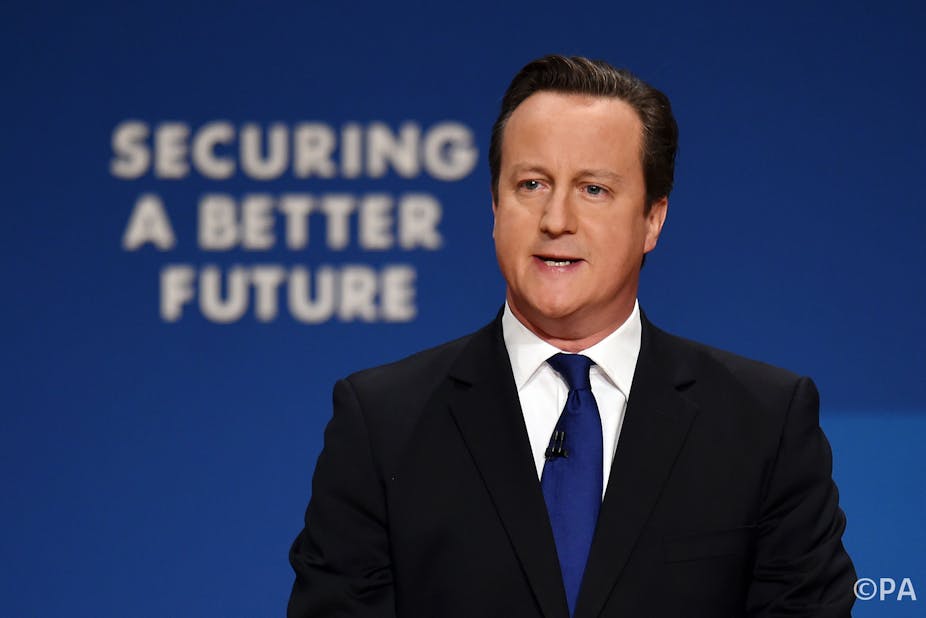In his speech at the Conservative party conference David Cameron claimed that a vote for UKIP is a vote for Labour, an argument likely to be heard with greater frequency as the general election approaches.
But is he right? The fact is, the Conservatives are facing a never-before-seen pincer movement which threatens their support in the 2015 general election. They are being squeezed from both ends of the political spectrum. On one side, the collapse of the Liberal Democrat vote since the last general election helps Labour more than the Conservatives. On the other, the rise in support for UKIP hurts them more than it does Labour. It’s a situation unprecedented in UK electoral politics.
We can get an idea of how this works by looking at the changes in support for the parties since the general election, using the Essex Continuous Monitoring survey – a monthly survey of the British electorate carried out by YouGov on behalf of the University of Essex.
In common with other polls, the survey asks respondents about their current voting intentions but also which party they voted for in the 2010 general election. By putting these two together, we can find out where current support for the parties comes from – and more to the point, where it is going.
The surveys of nearly 7,500 voters between January and July show the Conservatives averaged 34.2% in current voting intentions, Labour 36.5%, the Liberal Democrats 8% and UKIP 13.6%.
We can also see that of the 34% of the electorate planning to vote Conservative in 2015 30% had also voted Conservative in 2010. Just 1% were voters switching from Labour and 2.2% had voted for the Liberal Democrats.
The Labour figures are rather different, with 27.5% of the electorate planning to vote Labour having voted Labour in 2010. Another 1.6% had voted Conservative and 6.5% were switching from Liberal Democrat. This illustrates how Labour benefits much more from the collapse in support for the Liberal Democrats than the Conservatives.
When it comes to UKIP, only 3.6% of this 13.6% comes from 2010 UKIP voters and no less than 6.3% of the 13.6% from former Conservatives. Meanwhile, just 1.4% of current UKIP support comes from 2010 Labour voters, showing how much more the Conservatives are harmed by UKIP than Labour.
This is the pincer movement in action and it shows how difficult it is going to be for the Conservatives to win the next general election. Putting the two effects together, we can work out the gains and losses in support for the two major parties since 2010. For example, the survey shows that Labour receives 6.5% from the Liberal Democrats, at the same time it loses 0.3% to that party, which gives a net gain of 6.2%. It receives 0.3% from UKIP while losing 1.4% to that party for a net change of -1.1%.
So the pincer movement makes Labour better off to the tune of roughly 5% of the electorate in terms of gains from the Liberal Democrats and losses to UKIP (6.2% minus 1.1%). The equivalent figure for the Conservatives is approximately -4%.
We can use these figures to predict how the make up of the House of Commons will change at the general election. There are currently 82 Conservative seats that are vulnerable in the sense of having majorities over their rivals of less than 10% of the vote.
In elections for 60 of the Conservatives’ 82 seats, the runner up was Labour. If we assume that the current Conservative vote in these seats is reduced by 4% and the Labour vote is increased by 5% because of the net changes, Labour would win about 53 of the 82.
The constituency of Carlisle is a good example of the problem for the Tories. There, in 2010 the Conservatives took just over 39% the vote and Labour took just over 37%. The Liberal Democrats came third with just under 16%. If we apply the formula to the two parties, then the Conservatives should win just over 35% and Labour, on more than 42%, will take the seat.
There will of course be variations in these figures across the country and other things will happen as the election campaigning gathers pace to change things. These results can only provide and indication of what could happen but they do suggest that Cameron is right to emphasise the UKIP threat. According to our survey the Tories lose 6.3% of the electorate to UKIP and only gain 2.2% from the Liberal Democrats.
For most of the 20th century the left and centre-left in British politics were divided, so the party on the right tended to dominate government. Now that there is a new party on the right and Labour’s old rival on the left is in decline, this state of affairs has changed. The interesting question is whether or not the left will dominate the politics of the 21st century as much as the right did in the 20th century.

